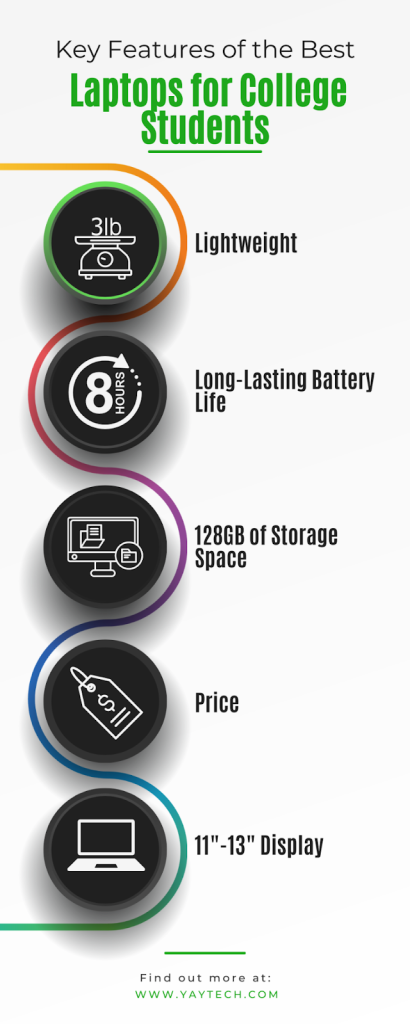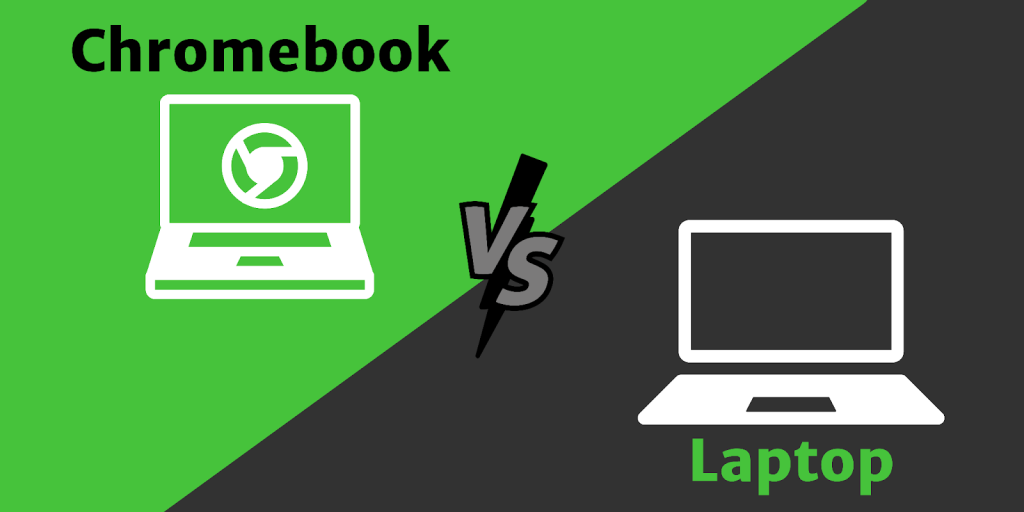5 Factors to Consider When Buying a Laptop for College
A laptop is one of the most important investments you should make when starting college. Let’s face it, college can be expensive. From textbooks to tuition fees, there’s no getting around the fact that higher education is an investment.
After all, having the right laptop for class makes your life A LOT easier (trust us!). But with so many factors to consider, it can take time to decide which laptop is best for you and your needs. So, let’s break it down and go over some key factors to consider when buying a computer for college.

 Battery Life
Battery Life
When you’re running between classes or studying in the library, you need a laptop that won’t die on you before the day is done. Look for laptops with at least 8 hours of battery life so that you can work without worrying about finding an outlet every few hours.
Weight
You don’t want to lug around a heavy book bag all day long! Look for laptops that weigh 3 pounds or less so they won’t strain your back muscles while carrying them from class to class.
Storage Space
Adequate storage space should be your primary consideration if you plan on downloading multiple programs and storing large files like videos and photos on your laptop.
Look for laptops with 128GB of storage space or more, giving you plenty of room for all your projects!
Portability
Portability is critical if you use your laptop for day-to-day lecture notes. You don’t want a bulky laptop occupying too much room in your backpack.
Look for laptops with 11-13 inch displays so they won’t take up too much space but still give you enough screen real estate to get things done quickly and efficiently.
Price
Let’s face it; price matters when buying a new laptop. And while there are many expensive models full of bells and whistles, they are not always necessary if you only need basic features like word processing and web browsing capabilities. Even budget-friendly options will get the job done! Discover what features are most important to YOU before making big purchases!
Conclusion
When searching for the perfect laptop for college, remember these five factors:
- Battery life
- Weight
- Storage capacity
- Portability
- Price
Each feature is necessary to help students stay organized throughout their academic journey. By keeping these key points in mind when shopping around for laptops, the world’s future leaders will have an easier time finding one that both fits their budget AND meets their needs. Good luck out there, future graduates — may your search yield great results!
Related Content
Frequently Asked Questions
What are five 5 factors to consider when buying a laptop?
- Your budget
- What you are going to use the laptop for
- Operating system (OS) and software compatibility
- Battery life and power requirements
- Screen size and portability
What features to consider when buying a laptop?
Some important specs to look for include the processor type, amount of RAM, and size of the hard drive. You’ll also want to make sure that the laptop has an adequate battery life. If you plan on using your laptop for entertainment purposes, you’ll want to make sure that it has a good graphics card and sound system. Finally, you’ll want to consider the price of the laptop.
What features should a student laptop have?
A laptop for students should have a good amount of storage, so that they can save all their school work on it. It should also have a fast processor, so that it can quickly open and run programs. And finally, the battery should last for a long time, so that students can use it without having to worry about it running out of power in the middle of working on an assignment.
Is 8GB RAM good enough for a laptop?
8GB RAM is a common amount of memory for laptops. It’s usually plenty for most people, but if you plan on doing a lot of intense multitasking or gaming, you might want to consider upgrading to 16GB or more.
What are the specifications of a good laptop 2022?
There is no one-size-fits-all answer to this question. However, some factors you may want to consider include processing power, memory capacity, screen size and resolution, and battery life. Keep in mind that technology is constantly evolving, so it’s important to choose a laptop that will be able to keep up with the latest advances. For example, if you plan on using your laptop for gaming or other graphic-intensive tasks, you’ll want one that has a good graphics processor. And if you’re looking for a model that offers flexibility and portability, go for one with a smaller screen size and lower weight.
Which model of laptop is the best for students?
If you’re just doing basic schoolwork, then a cheaper model like the Dell Inspiron 11 3000 would be fine. But if you need to do more intensive work or graphics-heavy tasks, then you’ll want something with a bit more power, like the Apple MacBook Pro. Make sure to get a laptop with a good amount of storage space so that you can save all your assignments and projects. And don’t forget to back up your computer regularly so that you don’t lose any important data in case of a crash!
When should I buy a laptop for college?
In general, you should buy a laptop for college when your current computer can’t meet the school’s requirements anymore. For example, if you’re using a desktop computer that doesn’t have a wireless card or if it doesn’t meet the minimum system requirements for the latest version of Windows or Mac OS, then it’s time to upgrade.
How many GB is good for a laptop for college?
It depends on what you need. If you just need the basics, like Word, Excel, and a web browser then 2-4 GB should be enough. But if you want to be able to store photos, music, and videos then you’ll need more storage. I would recommend at least 8GB.
Which core is best for a laptop?
If you want a powerful machine that can handle multitasking and gaming, then go for a quad-core. If you’re mostly interested in web browsing and basic office tasks, then a dual-core should do the trick.
Which laptop brand is most reliable?
PCWorld’s reliability survey of laptop brands found that Apple was the most reliable brand, with a failure rate of 11.8 percent. HP came in second with a failure rate of 18.9 percent, and Dell was third with a failure rate of 24.6 percent. It’s worth noting that these surveys are based on data from warranty repairs, so they don’t necessarily reflect how well the laptops hold up in the real world. Still, it’s an interesting look at which brands are most likely to cause problems for their owners.
Related Content
Best Budget-Friendly Laptops for Music Production
Music production can often be an expensive hobby, but it doesn’t have...
Chromebooks vs Laptops: Pros, Cons, & Recommendations
With so many options available, selecting a suitable laptop is becoming a...
5 Factors to Consider When Buying a Laptop for College
A laptop is one of the most important investments you should make...
Best Budget-Friendly Laptops for Working from Home
Working from home has become increasingly popular in recent years, and more...




